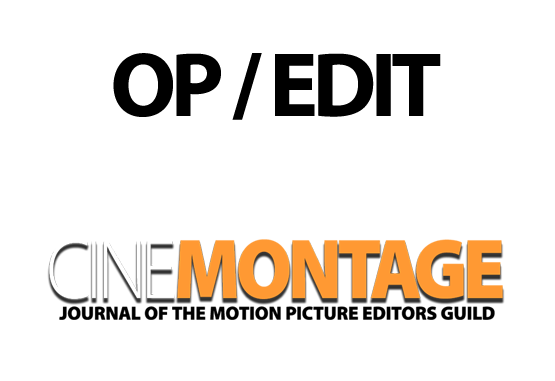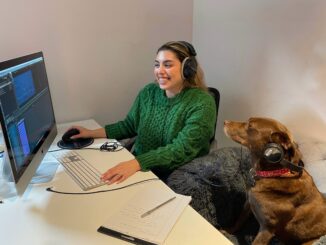
by Angie Rubin
I got a call last spring from a writer/director team with whom I’d previously worked on a feature film. I had a great working experience with them and so, without hesitation, said “yes” when asked to be the music editor on the network 30-minute romantic comedy pilot they were about to post. I know, I know—but no one had personally warned me of the potential horrors waiting for me in pilot post-production. Besides, I was told it would require a few days to a week of work. Piece of cake. And how could I not help out, especially as the writer/director team made a personal request for me?
Something was off from the beginning. I was told on day one in separate conversations with the producer, the associate producer and the post-production supervisor that music editor deals were done on a “flat fee” basis with no fringes or box-rental paid. I was also asked to work from my home studio with no room rental paid. When asked how I was to be paid, the reply was, “Just send an invoice.” Although none of this seemed right to me, I had no previous experience of such deals to go by and felt that people with whom I’d worked so successfully in the past would not lie to me. I was confident that everyone else in post was being paid on a flat-fee basis, so I jumped into the fire.
“A few days of work” quickly escalated into three weeks of non-stop work, including several 19-hour days, two Saturdays and two forced calls. I worked relentlessly, sometimes getting locked picture at midnight that was supposed to be back in the cutting room by 9:00 the following morning. Astoundingly, our forced calls were actually written into the post-production calendar!
I approached the director, the producer and the post supervisor on several occasions with my concerns about the excessive overtime. I pointed out that I wasn’t even making union scale as a result of the abusive hours. Not one of them wanted to deal with these alarming issues. Instead, they each passed the buck to someone else. And each time the buck was passed, I was met with the inevitable brick wall: “There is no more money for any department…” However, at the same time, there was plenty of money for a day of re-shoots. There was also money in the budget to hire a composer, even though ultimately only five seconds of his score was used in the pilot.
To those who’ve been mistreated or abused by less-than-ethical employers, let my journey through pilot season be a bracing lesson.
It wasn’t until the last day—the day of the mix—that I discovered what was really going on. As it neared midnight on the dubbing stage, the end of day that had started with an 8:00 a.m. set-up time, the sound editor sitting next to me commented that he didn’t mind how late we went because he was making “some serious OT.” The proverbial light bulb finally went on for me. I was the only one there on a flat fee.
I agonized over whether it was worth my while to contact the union. Virtually no one advised me to do so. Was it worth possibly risking future employment by rocking the boat? I was extremely wary of making that call. I didn’t want to be seen as “trouble.” All I wanted was a fair deal and an explanation for what had happened to me on that pilot.
After three months of waking up in night sweats of anger and frustration, I spoke with the assistant editor on that pilot. He convinced me to call the union. And the breathtaking simplicity of his logic finally resonated with me.
Initially, I called the union on a strictly off-the-record basis. Over time, the representative I dealt with gently took me through the options available to me. Although the union encouraged me to stand up for what is owed to me, I wasn’t pressured into blowing the whistle on the network. No demands were made of me.
From the union I learned that music editors are taken advantage of sometimes with greater frequency than many other post-production staffers. I learned that flat fees and no fringes are a direct violation of the union contract and that there is no such method of payment as “just send an invoice.” The show lied to me. Period. I decided to allow the union to file a grievance against the network if it would not pay me properly. The network eventually paid up, preferring to avoid arbitration.
All I wanted was a fair deal and an explanation for what had happened to me on that pilot.
My union representative guided me through a series of steps—which eventually led to me filing proper start-up paperwork and timecards with the network for all the monstrous hours of work I did on that pilot. I was paid every penny I was owed. My fringes were also paid.
Placing one telephone call to the union turned out to be the best thing I could have done for my self-esteem and my pride. I am no longer terrified of standing up for my rights. In less than six months, I’ve gone from wondering if I’d ever work again if I dared to challenge a behemoth network, to becoming the poster child for “Just Say No to Pilots.” I’m working on a feature now, a long gig that provides me with both artistic satisfaction and proper financial remuneration—the best of both worlds. It’s more than possible: it’s necessary.
To those who’ve been mistreated or abused by less-than-ethical employers, let my journey through pilot season be a bracing lesson. It’s never acceptable to let people take advantage of our time, skills and talent. If they do, pick up that phone right away. The union is ours for the asking.





